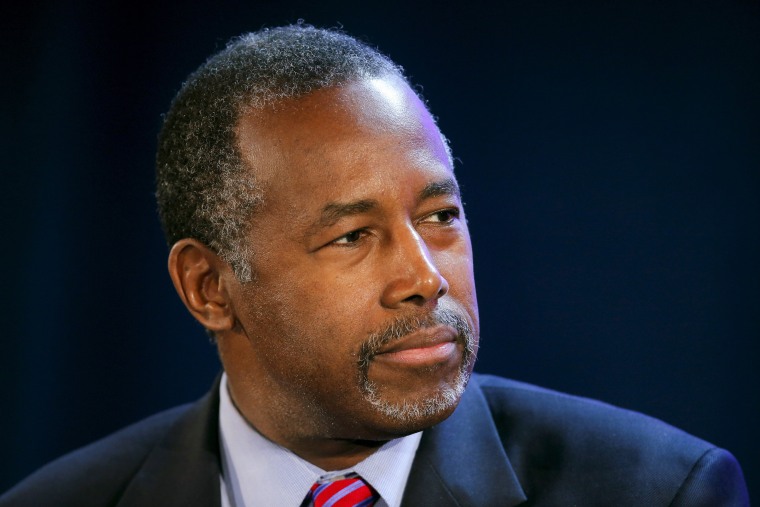DAVENPORT -- Dropping in the polls amid questions over the extent of his foreign policy knowledge, Ben Carson told an Iowa crowd on Sunday night that "nobody ever pays any attention" to his foreign policy positions - but President Obama and others use "almost the exact words" that he uses in talking about the fight against ISIS.
"I've said for multiple months, is that if we take the fight to [ISIS] over there, we're much less likely to have to fight them over here," Carson said in Wilton, Iowa. He expressed annoyance over the recent criticisms directed at him.
"I find it a little frustrating when I say things like that and nobody ever pays any attention," Carson said. "And they say, 'Carson doesn't know anything about foreign affairs.' And yet, everybody picks up on all of the stuff that I say, including President Obama, and starts using it themselves. I think it's very, very strange."
Talking to reporters later in Davenport, Carson suggested it is "hypocrisy" to question his foreign policy acumen.
"I don't mind people talking about all the things that I've been talking about," Carson told reporters. "But you know, don't act like I haven't said these things and that I don't have the knowledge, and because it comes out of somebody else's mouth, 'Oh, it's a wonderful thing.' I just, the hypocrisy just bothers me."
But when asked, Carson did not provide further examples of what positions others took from him.
A Fox News poll released on Sunday showed Carson dropping five percent, nationally, to 18 percent - now just four percentage points higher than Ted Cruz and Marco Rubio.
Over the previous months, Carson's plan to combat ISIS has focused on the need to recapture oilfields overtaken by the group, cutting off its key sources of money.
In evaluating ISIS' movement on Sunday, Carson said the U.S. should "use every resource available" to "wipe them out first" before letting them "grow."
He named Libya, Egypt, Tunisia, Somalia and Nigeria as having ISIS presence but did not expand in great detail on how the U.S. would "wipe" out ISIS in those countries or whether it would require U.S. military presence.
He suggested that if financially constrained, ISIS would then "probably just capitulate the land" in those countries.
Carson also reiterated that the U.S. should be at the forefront of building a coalition in which other countries believe the U.S. is fully invested in ensuring the region is politically stabilized, saying "you can't just run away from it, like we have done" in Libya and Egypt.
"You can't just call for people to form a strong coalition behind you," Carson said in Wilton. "You actually have to be leading. You have to be showing that you are a winner."
Turning his attention directly to Syria, Carson called for a "coalition government," suggesting Assad and "the anti-Assad people" cannot unite the war-torn country without the other.
But as Syrians continue to flee their nation, Carson reiterated that "there is absolutely no reason" to let Syrian refugees come to the U.S. when "jihadists can infiltrate their own people and create havoc" in the country.
During his remarks, Carson also sarcastically referred to Saudi Arabia as a U.S. ally. And in Davenport, he said the U.S. needs to "put [Vladimir Putin] back in his little box right where he belongs."
This weekend's comments from Carson come after a week in which one of his top foreign policy advisers told the New York Times that the candidate cannot get "one iota of intelligent information about the Middle East" when discussing the region. And Carson's suggestion that the Chinese military has advisers in Syria was met with deep skepticism.
